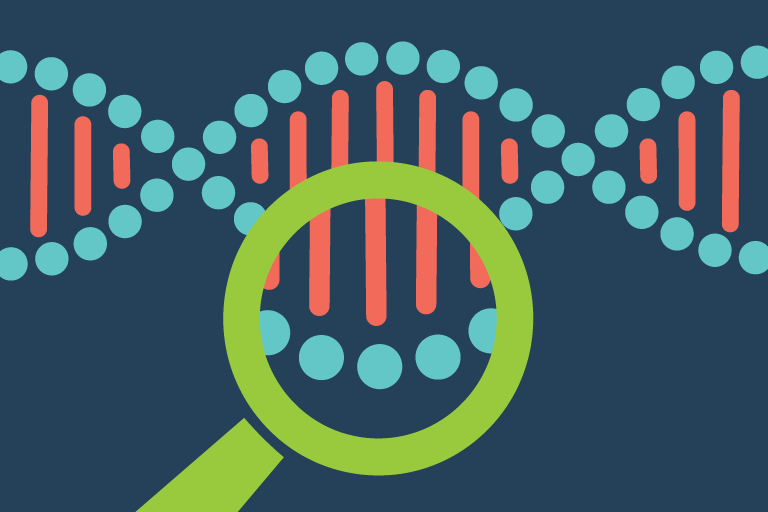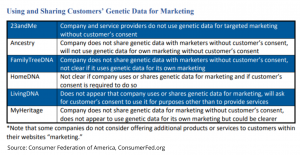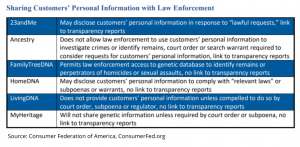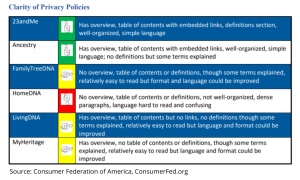You’ve probably seen those commercials for direct-to-consumer (DTC) genetic tests featuring people who discovered things about their families they never knew: Great-grandfather was a fisherman with blue eyes, just like me! Grandma fought for the right of women to vote! I have Native American roots! I found my long-lost sister! In one ad, a man trades in his lederhosen for a kilt when he finds that his ancestors came from Ireland and Scotland, not Germany as he had thought.
As we found when we studied marketing for DTC genetic tests, however, the results aren’t 100 percent accurate and vary from one company to another because they are estimates based on comparing your data to that of the company’s other customers. And as DTC genetic testing companies add more customers and collect more data, the results of their tests may change.
The information you receive can be interesting and educational. For example, tests for ancestry can point you in the direction of where your family probably came from, and you may get “DNA matches” to relatives you didn’t know about. Test results for “traits” and “wellness” can help you understand why you are prone to gaining weight or losing your hair and provide suggestions for improving your fitness. You may be surprised to know that the government does not review and approve these kinds of tests before they’re marketed to confirm that the claims made for them are valid.
DTC genetic tests for health risks such as developing cancer or reacting negatively to certain medications are required to be preapproved by the U.S. Food and Drug Administration before they’re sold, but there can be false positives and false negatives, and the results are not conclusive since other factors such as environment and lifestyle can affect your health. These tests are not intended to diagnose or treat health conditions. It’s essential to check with your doctor before taking any action based on DTC genetic health tests.
There are many other things to consider before you buy DTC genetic tests or give the kits to others. For instance, ancestry tests do not tell you the addresses where your forbearers lived, what their occupations were, whether they served in the military, or other details of their lives. Access to historical records, if available from the company, requires paying for an upgrade or a separate service. And you still have to do a lot of sleuthing yourself to identify the right records and put the pieces of the puzzle together.
It’s also important to realize that the results of ancestry or health tests can be unexpected, and in some cases upsetting. Discovering unknown relatives might be exciting, but it could create family stress and financial issues. You could learn that your ethnic origins are not what you thought, or that you’re not biologically related someone you thought you were, or that you’re at risk for a serious health problem.
Privacy is another concern. You can generally control what other customers of the DTC genetic testing company can see about you and how they can communicate with you, but you may have little control over whether the company uses your personal information to try to sell you other products and services and with whom the company shares it for marketing.
Your data may also be shared with law enforcement agencies under certain circumstances.
Furthermore, there is always the possibility of data breaches that could expose your personal information. In addition, you need to be careful about sharing test results or other personal information yourself – once it’s out there it’s not always possible to pull it back.
When you close your account with a DTC genetic testing company, it doesn’t mean that your personal information is erased. You may have to take an extra steps to have it deleted, and it’s possible that some information may still be kept for legal purposes. As awful as it is to read companies’ privacy policies, it’s really important to do so before you purchase a DTC genetic test kit, and to use the controls the company provides when you set up your account.
“There is a lot of helpful information on DTC genetic testing companies’ websites about genetics and how their services work, but we’re concerned that not many consumers will delve into it and [will] assume they’ll get more detailed and conclusive results than they actually will,” said Susan Grant, CFA Director of Consumer Protection and Privacy and report author.
From our study we concluded that DTC genetic testing companies need to do a better job of bringing important information to consumers’ attention on their websites and in their packaging, that they shouldn’t make claims about accuracy, and that they should make their privacy policies easier to read and understand.
There is also plenty that state legislatures and Congress can do to protect individuals’ privacy and to outlaw unfair practices such as forcing consumers to forgo their rights to go to court if companies have treated them badly (“mandatory binding arbitration” provisions and waivers of class actions are commonly found in DTC genetic testing companies’ terms of service and other consumer contracts).
You can read the full DTC genetic testing report or the condensed version here. We also have tips for consumers. The bottom line: DTC genetic testing is not a genealogy or a medical service. If you’re thinking of taking one of these tests, consider the benefits and risks, and don’t buy a test kit for someone else without checking with that person first to ensure that it would be a welcome gift.





